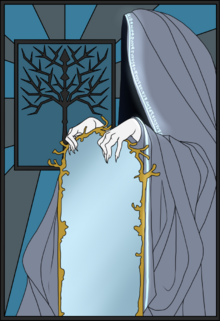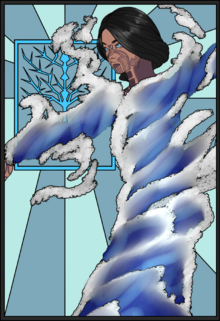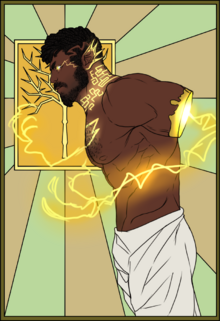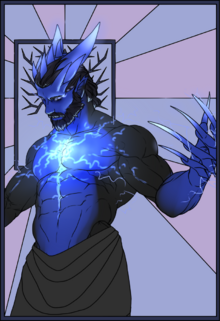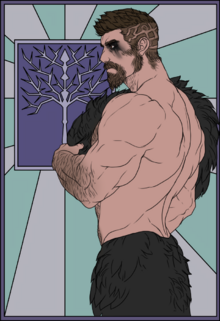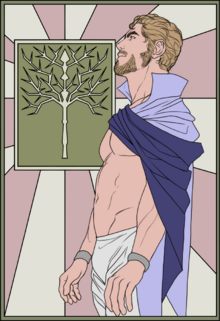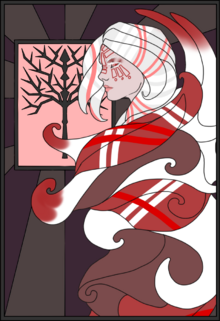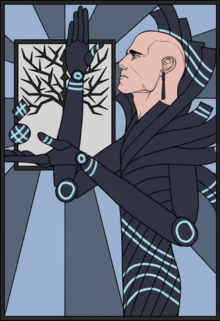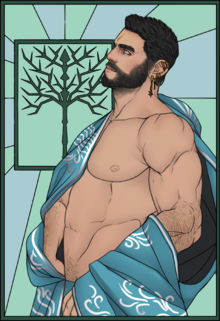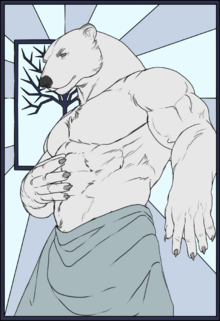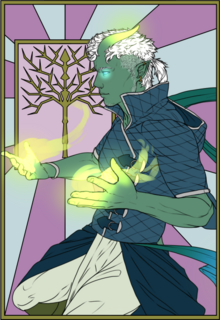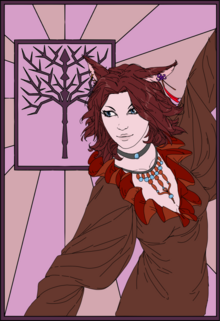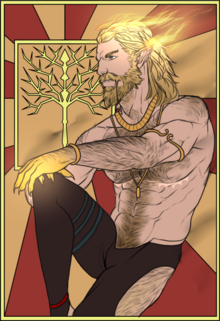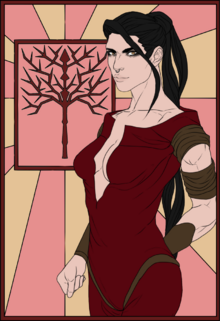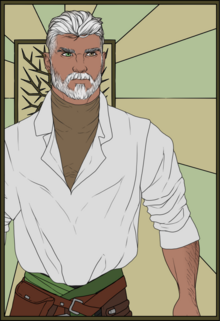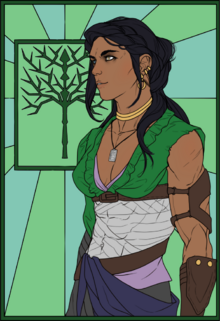More actions
No edit summary Tag: Reverted |
|||
| Line 43: | Line 43: | ||
*'''Relations:''' Bev is the husband of Hel, doomed to never embrace, as he cannot leave the water, and she cannot enter it. He is also tasked to hold up the Mirror, which Hel would destroy. | *'''Relations:''' Bev is the husband of Hel, doomed to never embrace, as he cannot leave the water, and she cannot enter it. He is also tasked to hold up the Mirror, which Hel would destroy. | ||
*'''Other Notes:''' It is believed that if Bev should ever drop the Mirror, it will shatter, and release the Soldi-less dead who reside within it, causing a terrible undead cataclysm to occur. | *'''Other Notes:''' It is believed that if Bev should ever drop the Mirror, it will shatter, and release the Soldi-less dead who reside within it, causing a terrible undead cataclysm to occur. | ||
* '''Cellik Variant:''' The Cellik Variant of Bev is called Cyne or Cyneweard, and as opposed to a mirror, he holds up a silver door. All other aspects are identical. | |||
|} | |} | ||
===Hel, Dancer of Death=== | ===Hel, Dancer of Death=== | ||
| Line 57: | Line 58: | ||
*'''Relations:''' Hel is the wife of Bev, but she cannot touch or be with him, as he resides below the ocean, and she can only dance on the surface of it: the source of her anguish. | *'''Relations:''' Hel is the wife of Bev, but she cannot touch or be with him, as he resides below the ocean, and she can only dance on the surface of it: the source of her anguish. | ||
*'''Other Notes:''' Hel is considered the goddess who takes lives, and knows when all Old Gods worshippers will die. This is mostly why Hel is feared rather than admired. | *'''Other Notes:''' Hel is considered the goddess who takes lives, and knows when all Old Gods worshippers will die. This is mostly why Hel is feared rather than admired. | ||
* '''Cellik Variant:''' The Cellik Variant of Hel is called Flaed or Flæd, and she is traditionally associated more with river water than ocean water, and subsequent floods and droughts. | |||
|} | |} | ||
| Line 72: | Line 74: | ||
*'''Relations:''' Adal is the twin brother of Odal, who he feels responsible for, eternally on a quest to convince Odal to return to the pantheon, but eternally failing. | *'''Relations:''' Adal is the twin brother of Odal, who he feels responsible for, eternally on a quest to convince Odal to return to the pantheon, but eternally failing. | ||
*'''Other Notes:''' It is said Adal’s arms were cut off by Bard, who had gone into a rage, though this is dubious, because many also claim he was born without arms. | *'''Other Notes:''' It is said Adal’s arms were cut off by Bard, who had gone into a rage, though this is dubious, because many also claim he was born without arms. | ||
* '''Cellik Variant:''' The Cellik Variant of Adal is Glaed or Glæd, and as opposed to thunder and lightning, he is more representative of light and the sun. | |||
|} | |} | ||
===Odal, Prince of Vengeance=== | ===Odal, Prince of Vengeance=== | ||
| Line 88: | Line 91: | ||
*'''Other Notes:''' Rarely, will Olds Gods' worshippers feel pushed enough to accept his ‘blessing,’ and become a demonically possessed avatar of vengeance, called Odalv. | *'''Other Notes:''' Rarely, will Olds Gods' worshippers feel pushed enough to accept his ‘blessing,’ and become a demonically possessed avatar of vengeance, called Odalv. | ||
*'''Other Notes:''' If they succeed their Odalv Quest, their Soldi is cleansed and they are restored, if they fail, he kills them and they are sent to the Mirror world. | *'''Other Notes:''' If they succeed their Odalv Quest, their Soldi is cleansed and they are restored, if they fail, he kills them and they are sent to the Mirror world. | ||
* '''Cellik Variant:''' The Cellik Variant of Odal is called Cynesige, while the Cellik version of the Odalv are called Sigeryk, though otherwise all is identical. | |||
|} | |} | ||
===Bard, King of Bears=== | ===Bard, King of Bears=== | ||
| Line 103: | Line 107: | ||
*'''Other Notes:''' Despite Bard's Bears being eradicated in Carrhen, a small branch of them is yet alive in Talahm Gall, a rugged province of Gallovia. | *'''Other Notes:''' Despite Bard's Bears being eradicated in Carrhen, a small branch of them is yet alive in Talahm Gall, a rugged province of Gallovia. | ||
*'''Other Notes:''' Bard’s fits of rage are legendary, and uncontrollable, losing all semblance of humanity during them, except for Njal's artistic touch. | *'''Other Notes:''' Bard’s fits of rage are legendary, and uncontrollable, losing all semblance of humanity during them, except for Njal's artistic touch. | ||
* '''Cellik Variant:''' The Cellik Variant of Bard is called Brom, and he is effectively identical, though the animal associated with him is the wolf instead of the bear. | |||
|} | |} | ||
| Line 118: | Line 123: | ||
*'''Relations:''' Njal once roamed to find the perfect art. Then he met bard, and realized the perfect art was man. They soon fell in love and married. | *'''Relations:''' Njal once roamed to find the perfect art. Then he met bard, and realized the perfect art was man. They soon fell in love and married. | ||
*'''Other Notes:''' Njal always has heterochromia, one light blue eye and one light brown, which he uses to always watch Bard, who has dark brown eyes. | *'''Other Notes:''' Njal always has heterochromia, one light blue eye and one light brown, which he uses to always watch Bard, who has dark brown eyes. | ||
* '''Cellik Variant:''' The Cellik Variant of Njal is called Aedel or Ædel, though all other aspects about him are identical to Njal. | |||
|} | |} | ||
| Line 133: | Line 139: | ||
*'''Relations:''' Gro is the wife of Jord, both bargained with the Great Betrayer (which they were expelled for), forcing the Velheim people in millennia of hell, but saving them from slavery. | *'''Relations:''' Gro is the wife of Jord, both bargained with the Great Betrayer (which they were expelled for), forcing the Velheim people in millennia of hell, but saving them from slavery. | ||
*'''Other Notes:''' The memory of Gro and Jord is said to have faded when the Old Gods worshippers broke free from the Great Betrayer, called the 'Liberation'. | *'''Other Notes:''' The memory of Gro and Jord is said to have faded when the Old Gods worshippers broke free from the Great Betrayer, called the 'Liberation'. | ||
* '''Cellik Variant:''' The Cellik Variant of Gro is identical to the Velheim Old Gods version, name included, because the split occurred close to the Velheim divergence. | |||
|} | |} | ||
| Line 148: | Line 155: | ||
*'''Relations:''' Jord is the husband of Gro, both bargained with the Great Betrayer, forcing the Velheim people in millennia of hell, but saving them from slavery. | *'''Relations:''' Jord is the husband of Gro, both bargained with the Great Betrayer, forcing the Velheim people in millennia of hell, but saving them from slavery. | ||
*'''Other Notes:''' The memory of Jord and Gro is said to have faded when the Old Gods worshippers broke free from the Great Betrayer, called the 'Liberation'. | *'''Other Notes:''' The memory of Jord and Gro is said to have faded when the Old Gods worshippers broke free from the Great Betrayer, called the 'Liberation'. | ||
* '''Cellik Variant:''' The Cellik Variant of Jord is identical to the Velheim Old Gods version, name included, because the split occurred close to the Velheim divergence. | |||
|} | |} | ||
===Halfvel, the Father of Demigods=== | ===Halfvel, the Father of Demigods=== | ||
| Line 162: | Line 170: | ||
*'''Relations:''' Halfvel has no formal relations with the Pantheon, as he largely avoids them altogether, concerning himself more with creating the fates in the mortal world. | *'''Relations:''' Halfvel has no formal relations with the Pantheon, as he largely avoids them altogether, concerning himself more with creating the fates in the mortal world. | ||
*'''Other Notes:''' Halfvel's Demigod children supposedly have icy-blue eye-color, a high rarity among Ailor. Halfvel turns an unborn child or conceives each Demigod for a specific fate, some bad, some good. | *'''Other Notes:''' Halfvel's Demigod children supposedly have icy-blue eye-color, a high rarity among Ailor. Halfvel turns an unborn child or conceives each Demigod for a specific fate, some bad, some good. | ||
* '''Cellik Variant:''' The Cellik Variant of Halfvel is Godsun, and as opposed to the wolf, his representative animal is the Lynx. All other aspects are the same. | |||
|} | |} | ||
===Asbjørn, the Punished Winter=== | ===Asbjørn, the Punished Winter=== | ||
| Line 176: | Line 185: | ||
*'''Relations:''' Asbjørn is said to be madly cursed and in love with Bard, but this has been pulled into question recently because none of the other folklore supports this sentiment. | *'''Relations:''' Asbjørn is said to be madly cursed and in love with Bard, but this has been pulled into question recently because none of the other folklore supports this sentiment. | ||
*'''Other Notes:''' Asbjørn is sometimes somewhat dubiously treated because it unclear if he genuinely wants to help those seeking restitution through punishment, or is just using them to get to Bard. | *'''Other Notes:''' Asbjørn is sometimes somewhat dubiously treated because it unclear if he genuinely wants to help those seeking restitution through punishment, or is just using them to get to Bard. | ||
* '''Cellik Variant:''' The Cellik Variant of Asbjørn is Vitbera, and his origin story is different. As opposed to a relation to Brom, he is simply the eternal representative of winter. | |||
|} | |} | ||
===Frode, Carer of Spring=== | ===Frode, Carer of Spring=== | ||
| Line 190: | Line 200: | ||
*'''Relations:''' Frode is the twin sibling of Toke, and the two are said to dance in the forests, cycling between Spring and Autumn, until Leif burns in Summer and Asbjørn freezes in winter. | *'''Relations:''' Frode is the twin sibling of Toke, and the two are said to dance in the forests, cycling between Spring and Autumn, until Leif burns in Summer and Asbjørn freezes in winter. | ||
*'''Other Notes:''' Frode is why Old Gods worshipers have a positive relation to Yanar, and can often connect quite well with the Estellon worshipers in Yanar inhabited regions in Regalia. | *'''Other Notes:''' Frode is why Old Gods worshipers have a positive relation to Yanar, and can often connect quite well with the Estellon worshipers in Yanar inhabited regions in Regalia. | ||
* '''Cellik Variant:''' The Cellik Variant of Frode is called Faegen or Fægen, and he is entirely identical to the Velheim variant of Old Gods. | |||
|} | |} | ||
===Toke, Lirh of Autumn=== | ===Toke, Lirh of Autumn=== | ||
| Line 204: | Line 215: | ||
*'''Relations:''' Toke is the twin sibling of Frode, and the two are said to dance in the forests, cycling between Spring and Autumn, until Leif burns in Summer and Asbjørn freezes in winter. | *'''Relations:''' Toke is the twin sibling of Frode, and the two are said to dance in the forests, cycling between Spring and Autumn, until Leif burns in Summer and Asbjørn freezes in winter. | ||
*'''Other Notes:''' Toke is why, even when killing wildlife for the hunt or sacrifice, Old Gods are always respectful, and will say a prayer for Toke to receive the animal's soul. | *'''Other Notes:''' Toke is why, even when killing wildlife for the hunt or sacrifice, Old Gods are always respectful, and will say a prayer for Toke to receive the animal's soul. | ||
* '''Cellik Variant:''' The Cellik Variant of Toke is called Aestas or Hiems. Hiems actually also means winter in Old Ceardian, because their winters were mild like autumns. | |||
|} | |} | ||
===Leif, Summer of Passion=== | ===Leif, Summer of Passion=== | ||
| Line 218: | Line 230: | ||
*'''Relations:''' Leif is the husband of Estrid, though they are more than that, the folklore specifically defines them as soul mates with a fated connection. | *'''Relations:''' Leif is the husband of Estrid, though they are more than that, the folklore specifically defines them as soul mates with a fated connection. | ||
*'''Other Notes:''' Leif is claimed to have a particular burning hatred for those who discriminate based on gender, supposedly spontaneously immolating terrible offenders. | *'''Other Notes:''' Leif is claimed to have a particular burning hatred for those who discriminate based on gender, supposedly spontaneously immolating terrible offenders. | ||
* '''Cellik Variant:''' The Cellik Variant of Leif is Aeledda, or Æledda, entirely identical, though has a feminine coded name as opposed to a masculine coded one. | |||
|} | |} | ||
===Estrid, Queen of War=== | ===Estrid, Queen of War=== | ||
| Line 232: | Line 245: | ||
*'''Relations:''' Estrid is the wife of Leif, though they are more than that, the folklore specifically defines them as soul mates with a fated connection. | *'''Relations:''' Estrid is the wife of Leif, though they are more than that, the folklore specifically defines them as soul mates with a fated connection. | ||
*'''Other Notes:''' Estrid is sometimes blamed for the reversal of Velheim expansion in the world, coinciding with the quick rise of the Regalian Empire. | *'''Other Notes:''' Estrid is sometimes blamed for the reversal of Velheim expansion in the world, coinciding with the quick rise of the Regalian Empire. | ||
* '''Cellik Variant:''' The Cellik Variant of Estrid is Deorcnysse, which is incidentally also the word for Darkness in old Ceardian. | |||
|} | |} | ||
| Line 247: | Line 261: | ||
*'''Relations:''' Hagen's relation to Tove is somewhat dubious, sometimes depicted as two sides of the same coin, sometimes he is depicted as her grandfather. | *'''Relations:''' Hagen's relation to Tove is somewhat dubious, sometimes depicted as two sides of the same coin, sometimes he is depicted as her grandfather. | ||
*'''Other Notes:''' Hagen appears different each time, sometimes of passable age, sometimes so decrepitly old that his beard touches the floor and drags behind him. | *'''Other Notes:''' Hagen appears different each time, sometimes of passable age, sometimes so decrepitly old that his beard touches the floor and drags behind him. | ||
* '''Cellik Variant:''' The Cellik Variant of Hagen is Werold, but he is otherwise completely identical to the Velheim Old Gods variant. | |||
|} | |} | ||
===Tove, Daughter of Dreams=== | ===Tove, Daughter of Dreams=== | ||
| Line 261: | Line 276: | ||
*'''Relations:''' Tove's relation to Hagen is somewhat dubious, sometimes depicted as two sides of the same coin, sometimes she is depicted as his granddaughter. | *'''Relations:''' Tove's relation to Hagen is somewhat dubious, sometimes depicted as two sides of the same coin, sometimes she is depicted as his granddaughter. | ||
*'''Other Notes:''' Tove appears different each time, sometimes as an adult, but more often than not as a recalcitrant teenager, ready to combat Hagen's opinions. | *'''Other Notes:''' Tove appears different each time, sometimes as an adult, but more often than not as a recalcitrant teenager, ready to combat Hagen's opinions. | ||
* '''Cellik Variant:''' The Cellik Variant of Tove is called Cihnt (pronounced as see-h't), and she is identical to the Velheim Old Gods variant. | |||
|} | |} | ||
==Trivia== | ==Trivia== | ||
Revision as of 01:41, 26 September 2022
| Fornoss | |
|---|---|
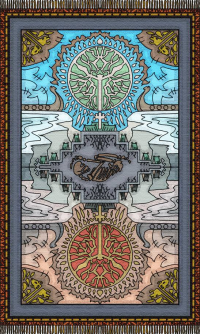 | |
| Religion | |
| Pronunciation | Old-Gods |
| Origins | Old Ceardia |
| Deities | |
| Too many to list | |
Origins
The origins of the Old Gods Religion are somewhat murky, because of intensely conflicting versions. Old Gods as a religion has always lacked an organized hierarchy, and so local communities as well as diasporas do not agree on a common origin tale. While many Regalians consider Old Gods synonymous with the Velheim Culture, they actually are not, and there are more Ceardians who worship Old Gods under the Cellik variant than there are Velheim Old Gods worshipers. Old Gods reaches beyond these cultures however, with Zvorun, Tarkkin, and Dunbrae all having slight variations on the same ideology. All Old Gods worshipers agree that their faith started on the island of Yervonth (called Jerl in old Velheim) however they all disagree with what happened after. Cellik and Velheim Old Gods however are the two largest denominations controlling around 80% of the total worshiper population, and as such, their version is generally accepted as common dogma. Cellik and Velheim Old Gods doctrine claims that when the menace from the west (Nelfin slavers) arrived on the shores of Ceardia, that a group of Pagan Gods created a pantheon together and spirited large communities away from the Ceardian continent, harboring them in safety on the Yervonth island. From here, Old Gods would continue to spread over the world with migration waves, however the further they went, the more their doctrine was changed by local variations and changes. Unlike Unionism, Old Gods never underwent any major cataclysmic changes or schisms. As such, this page will treat the average understanding of Old Gods as fact, though minor local variations like changing a God's name or patron identity is permissible.
Core Identity
Old Gods is a religion that developed out of the old concept of Ailor Paganism in Ceardia, which was a polytheistic religion with a theoretical infinite amount of gods. Old Gods as a religion reformed this principle, attaching itself to the tangible gods that the people could see and interact with, and then centralized religion to them. Old Gods as a religion is centered around the concepts of Honor of the Soul, which is similar to Asaredu, but not strictly bound to combat honor alone, rather to the purity of one's soul as understood through the lens of behavior, actions, and things said. Old Gods worshipers refer to the Honor of the Soul as Soldi. It is actually a common misconception to think that Old Gods worshipers refer to their own religion as Old Gods. This is incorrect, because the term Old Gods was used by Unionists to refer to the faith that was largely replaced in the Archipelago by Unionism. Old Gods is actually referred to as Sjelbyrd by Velheimers or Selbarad by Cellik Old Gods worshipers. Because Ailor kind however has so many varied cultures, and because so few of them still worship the Old Gods, the term Old Gods has simply become commonly used, even by Velheimers when they speak Common.
Tenets
- Bravery: Soldi is gained with bravery, to fight against foes that overwhelm and overpower, to seek out challenges that bring glory and honor to one's family name, and to generally not show cowardice. Soldi is lost by showing cowardice and shirking from one's duties. One must always accept challenges, even if they could result in death or infamy. One must always commit to one's decisions.
- Wroth: Soldi is not strictly gained by being mean or violent, but rather by the idea that one should never give up or simply let things happen that one does not want to happen. Inversely, Soldi is lost by simply being meek and weak and letting events transpire without affecting them. One must never shirk from duties, or show weakness when strength and power are demanded by the public eye.
- Pleasure: The matter of chasteness versus pleasure is not really a matter that demands any Soldi satisfaction. Old Gods worshipers just don't really believe in chastity. That being said, dishonesty and deceit to one's lovers and spouse(s) results in loss of Soldi. One must always remain honest and truthful to those who one spends their life with, and afford them respect as if they are gods themselves.
- Vengeful: Soldi is gained by settling scores, Soldi is lost by letting a vendetta or nemesis simply walk all over one's self. Old Gods worshipers declare Motsaga against a person to declare them their enemy with scores to settle. The Old Gods worshipers came up with the saying "An eye for an eye". If another person is not strong enough to settle their scores, one can offer to do it for them, for Soldi's sake.
- Greed: Soldi is not specifically gained or lost while being charitable or greedy, but Old Gods as a religion generally rewards those who attain and retain the power to seize what they want and be merciful with what they have, but shows little favor on those too weak to make their own destiny. Greed over finances is however not encouraged. Old God worshipers should put little value in money, and more in possessions.
- Honest: Soldi is lost with deceit and lying, though not specifically while withholding information. Old Gods religion has a concept of "white-lies", and only punishes those who tell lies for explicit personal gain or to prevent danger to self (which they must be brave to face). White lies are acceptable if they prevent someone else from losing Soldi, or make everyone happier and easier off in the long run.
- Pride: Soldi is gained when others are aware of how great a person is, and Soldi is lost if a person is forgettable and irrelevant in the scope of history. Old Gods worshipers should endeavor to make sure their skills and talents are always known to others. One should never have paintings or statues made of one's self however. Artistic vanity is considered taboo, one can only accept such gifts made by others.
- Respect: A very important aspect of Old Gods worship is the acknowledgement of respect. While one must be proud of one's self, one must always deeply respect the skills of others, and pay homage to those who are simply better (even if they deserve a challenge here and there). One should never ever pretend like even one's enemies have no qualities or respect worthy aspects about them and one must vocalize them without spite.
- Soldi: The most important aspect of Old Gods is Soldi, which is like a currency of Honor. There is no strict numerical minimum or maximum, but being accused of being without Soldi is the worst insult to levy against an Old Gods worshiper, one that they believe condemns their soul. When someone's Soldi is lost, it is possible for relatives or friends to try and reclaim Soldi for that person by attributing their deeds to them.
- Loyalty: A very important aspect of Old Gods is loyalty, which can mean loyalty to family, to lovers, to one's overlord, one's ruler, or just the gods. Vows of loyalty are taken very seriously, and breaking one is considered a great way to lose all Soldi instantly. In the Regalian context, this usually means loyalty to the Gods, but also loyalty to one's Duke or Emperor depending on one's position.
Beliefs
- Narrative: In Old Gods beliefs, the world is one giant proving grounds for all living things (even wild animals) to prove the value of their soul and prevent loss of Soldi until they die. While all living things are born with Soldi, the effects of evil causes them to commit sins. Sins causing a loss of Soldi are a person's soul showing weakness and thus not having the right to pass into the afterlife. Old Gods dictates that while bodies are made by the gods, and Dragons create a kindling of a soul, that ultimately a soul's development, nurturing, and aging, is entirely up to the person themselves. When a person dies and their soul has enough Soldi they pass into the afterlife or the Valley of Life, which is an idealized version of life with drinking, feasting, and fun. When a person who passes into the Valley of Life also has a hero or legendary status soul through some great achievement or fame in life, they go to the Valley of Legends, which is an upgraded version of this afterlife where their every whim is satisfied. In case a soul is deemed without Soldi, they are condemned to the Mirror world, where the soul wanders for eternity on the salt-flats without color, smell or sound as penance. It is said that some souls have such evil in their hears that they escape the Mirror world, and become Undead in the real world. This is why Old Gods worshipers have such a negative view of Undead who were Old Gods worshipers in a prior life, but are apathetic to Undead from other religions.
- Canon Evil: Canon Evil in Old Gods is called Demons, which takes similar origins as Unionism, but has a more flexible interpretation. On one hand, Old Gods worshipers do acknowledge Demons from the Void, Exist, and Bintaar as evil with corrupting intentions. They refer to them as Betrayers, with one particular Demon called The Great Betrayer being the worst, which scholars believe to be the Arken of Power. Demons seduce people into doing things that ruins their Soldi with promises of power, fame and legend. On the other hand, Old Gods worshipers acknowledge the evil in mortals as a far more realistic source of bad things in life. It is said that the Gods and Dragons made a pact, with the Gods making the bodies of Ailor-kind, and the Dragons providing the breath of life, which would create a seedling of a soul. However, as life develops, the person who the soul belongs to creates the expressions, actions and feelings of the soul themselves as it grows over time, and that evil is simply the person being too weak to hold onto virtues in life and engaging in sin. As such, evil can neatly be defined as either Demons inducing weakness in otherwise strong people, or weakness just existing in a soul because the person themselves are weak.
- Identity: Old Gods dogma has no explicit gender, sex, sexual orientation or gender-identity bias, though it has an implicit male-bias. While any Old Gods worshiper will claim that all genders and sexes are equally fair in their religion, traditional male-coded masculinity takes a unique place that discolors a lot of the nuance about gender. Strong, masculine and emotionless are framed as virtues for men living by the examples of their gods, and so Old Gods society can come across as publicly egalitarian, but having hidden masculine preferences under the surface.
- Conversion: Old Gods as a religion does not require preaching or spreading through missionaries, which is usually a practice reserved for Estellon and Unionism, though to say it is without violent impression is false. Among Old Gods worshipers, holy wars can rage between two distinct populations over small denominational ideals (some as ridiculous as the believed hair color of a god), but bigger conflicts arise with other religions. Old Gods worshipers in general are very intolerant to other religions mostly born out of necessity, because disloyalty to the gods (for example by converting from Old Gods to Unionism) means a complete loss of Soldi and thus a soul being condemned to the Mirror world. Old Gods worshipers have been known to force their faith at the end of a sword and axe, especially in the far north where they are in the majority. Old Gods worshipers also frequently deface religious symbols of other faiths or engage in desecration of holy sites.
- Sins & Taboo: The worst cases of sinning and taboo for Old Gods are disloyalty to god, family and one's leaders, backstabbing, betrayal, deceit for greed's sake, and refusing a challenge of honor or duel of honor and abiding by cowardice. Never does a single sin or transgression cause Soldi to be lost fully, it is more like a currency that slowly leaks away, however repeat offenses do cause eventual loss of Soldi altogether. Old Gods does not really have a central body of priests to condemn a person, but generally speaking, Old Gods communities have a very communal sense of expelling a member when they believe their Soldi to be too far gone.
Gods and Goddesses
Old Gods recognizes one greater entity called Arne, the Tree of Life, from which all Old Gods worshiper believe Ailorkind was born (and by extension, every other living entity on Old Ceardia), though it is somewhat nebulous whether this refers specifically to Old Gods heritage Ailor, or all Ailor of the entire Race. Old Gods doctrine never made any claims on how the world or reality actually started, but implied that other religions are valid (to a degree) because they refer to the "Old World", where-as the world in which Old Gods exists now is the "New World". Simpler put, Old Gods acknowledges other religions and beliefs that pre-date itself as legitimate within their time-frame, but claims that with the birth of Old Gods, those religions or beliefs became invalid for Ailor, and that Old Gods is the only valid truth. This does mean that Old Gods is a mostly Ailor-centric religion. This causes particular conflict with Unionists. While Old Gods believers claim that the Everwatcher probably is real, they consider the faith false, because it induces its followers to engage in actions that cause them to lose Soldi and be condemned to the Mirror World. Arne supposedly stood in Old Ceardia for many centuries, until he communed with Dragons (who are not considered divine, rather just really powerful entities of legend), and developed a voice. With his voice, he spoke to fauna and flora, and with them approaching his roots, his mind expanded. With expansion came his desire to create his own life, and so with each new animal or event around Arne that he became aware of, a new god or goddess was born, creating the traditional pantheon by willing them into existence, which in turn caused them to create the Ailor Race. Arne is not worshiped however, because while he is the Tree of Life, he is seen more as a means to an end, and when all the Gods were born, he went into a lifeless slumber that created the afterlife in his dreams, the Gods and Goddesses instead are worshiped. Arne's physical body is believed to have perished with the Destruction of Ceardia, however this didn't spell disaster, as it is believed that his spirit and dreams (and thus the afterlife) live on even without his physical form.
Bev, Mirror of Life
Hel, Dancer of Death
Adal, Prince of Forgiving
Odal, Prince of Vengeance
Bard, King of Bears
Njal, Prince of Art
Gro, Shaper of Flesh
Jord, Forger of Metal
Halfvel, the Father of Demigods
Asbjørn, the Punished Winter
Frode, Carer of Spring
Toke, Lirh of Autumn
Leif, Summer of Passion
Estrid, Queen of War
Hagen, Crafter of Time
Tove, Daughter of Dreams
Trivia
| ||||||||||
| Accreditation | |||||||
|---|---|---|---|---|---|---|---|
|
| ||||||
